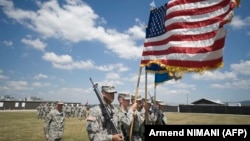A US decision to suspend a "strategic dialogue" with Kosovo has rocked the Balkan country's establishment, singling out Prime Minister Albin Kurti as a source of growing frustration in Washington -- his country's prime political and military guarantor.
The move, announced by the US Embassy on September 12, came after months of political turmoil in Kosovo and weeks after Secretary of State Marco Rubio announced that a US-Serbia "strategic dialogue" would be launched.
Kosovar President Vjosa Osmani said the relationship with Washington was "an existential part of our state and national identity" while voicing "deep regret and concern" following the US decision.
It was Osmani, back in January, who announced that the "strategic dialogue" would soon be finalized. Now it has been suspended before even starting.
“The United States wants to send a clear message” to Kosovo, said Charles Kupchan of the Council on Foreign Relations. “Get a government up and running, act according to the rule of law, and return to constructive dialogue with Serbia,” he told RFE/RL’s Kosovo Service.
The United States has been Pristina's main ally and backer since NATO forces in 1999 ousted Serbian troops and Belgrade's authorities from Kosovo, which was then a province of Serbia that was seeking independence. Serbia still refuses to recognize the country.
Kosovo has been in political deadlock since Kurti's party, Vetevendosje, won parliamentary elections in February.
While it won 48 seats, it fell short of a majority and needed to agree with other factions to elect a new parliament speaker and form a government. It took more than 50 failed votes before a speaker was finally elected, along with four deputies.
But a fifth, representing Kosovo’s ethnic Serb minority, has still not been elected. In response, the Constitutional Court has imposed a temporary measure blocking further steps toward forming a government.
It was the latest stage in an escalating conflict between Kurti and the court, which he has described as a "shadow opposition."
It also underlined Kurti's fraught relations with the Serb minority, as did an unsuccessful attempt to ban the Serbian List party from elections. Kurti claimed it served parallel institutions set up by Serbia, which has never recognized Kosovo's independence.
The ban was also blocked by the courts.
"We need a partner who understands the need to avoid destabilizing actions and is committed to advancing regional stability and protecting the rights of all citizens of Kosovo," a US Embassy spokesman told RFE/RL.
The embassy's September 12 statement specifically named Kurti, citing his "recent actions and statements" as threatening years of joint political progress.
Toby Vogel from the Berlin-based Democratization Policy Council, an advocacy group, said Washington was sending a signal that it wanted distance itself from Kurti.
"It used to be that the US President or the German chancellor, when it was still Angela Merkel, would pick up the phone and call the likes of (former President) Hashim Thaci and tell him what to do, and he would do it…. Kurti is not like that. And so, he is resented in Washington, and he is resented in Brussels."
Gezim Visoka, professor of peace and conflict studies at Dublin City University, told RFE/RL that the US move was "another warning sign for the government of Kosovo that international support for the country is fading."
He added that it does not mean "the end of bilateral relations." But it will now be a challenge for Kurti to rebuild them.
European countries have also voiced exasperation in recent months. The European Union has tied political progress with the release of a nearly $7 billion aid package.
"For that to happen, Kosovo needs functioning institutions that can effectively implement reforms, and that's why I encourage all parties to break the political stalemates and swiftly form a government," EU foreign policy chief Kaja Kallas said during a visit in May.
But the US move may be more alarming. The United States was instrumental in establishing Kosovo's independence from Belgrade in 2008 and still has some 600 troops there.
An imminently expected Pentagon review is expected to announce a substantial downsizing of US forces in Europe.












